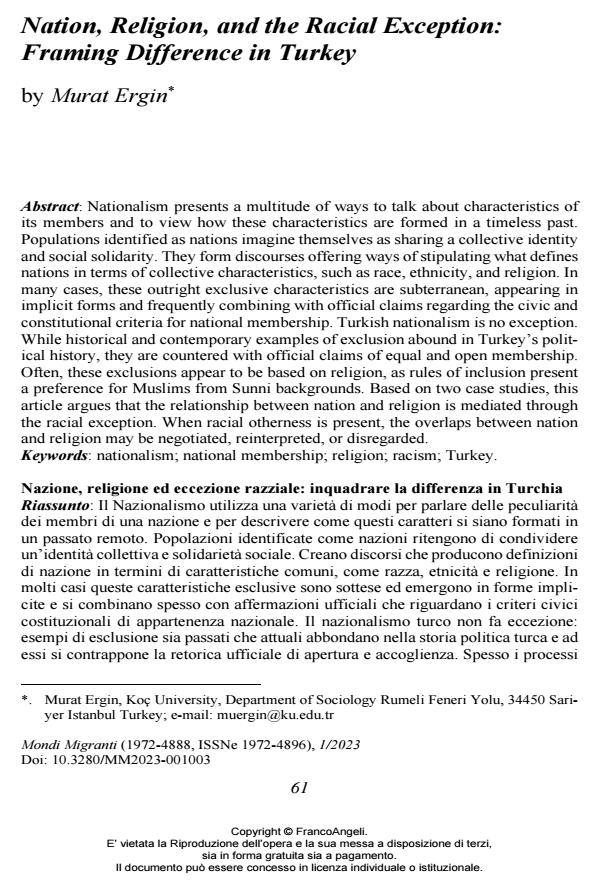Nation, Religion, and the Racial Exception: Framing Difference in Turkey
Titolo Rivista MONDI MIGRANTI
Autori/Curatori Murat Ergin
Anno di pubblicazione 2023 Fascicolo 2023/1
Lingua Inglese Numero pagine 20 P. 61-80 Dimensione file 218 KB
DOI 10.3280/MM2023-001003
Il DOI è il codice a barre della proprietà intellettuale: per saperne di più
clicca qui
Qui sotto puoi vedere in anteprima la prima pagina di questo articolo.
Se questo articolo ti interessa, lo puoi acquistare (e scaricare in formato pdf) seguendo le facili indicazioni per acquistare il download credit. Acquista Download Credits per scaricare questo Articolo in formato PDF

FrancoAngeli è membro della Publishers International Linking Association, Inc (PILA), associazione indipendente e non profit per facilitare (attraverso i servizi tecnologici implementati da CrossRef.org) l’accesso degli studiosi ai contenuti digitali nelle pubblicazioni professionali e scientifiche.
Nationalism presents a multitude of ways to talk about characteristics of its mem-bers and to view how these characteristics are formed in a timeless past. Popula-tions identified as nations imagine themselves as sharing a collective identity and social solidarity. They form discourses offering ways of stipulating what defines nations in terms of collective characteristics, such as race, ethnicity, and religion. In many cases, these outright exclusive characteristics are subterranean, appearing in implicit forms and frequently combining with official claims regarding the civic and constitutional criteria for national membership. Turkish nationalism is no ex-ception. While historical and contemporary examples of exclusion abound in Tur-key’s political history, they are countered with official claims of equal and open membership. Often, these exclusions appear to be based on religion, as rules of in-clusion present a preference for Muslims from Sunni backgrounds. Based on two case studies, this article argues that the relationship between nation and religion is mediated through the racial exception. When racial otherness is present, the over-laps between nation and religion may be negotiated, reinterpreted, or disregarded.
Il Nazionalismo utilizza una varietà di modi per parlare delle peculiarità dei membri di una nazione e per descrivere come questi caratteri si siano formati in un passato remoto. Popolazioni identificate come nazioni ritengono di condividere un’identità collettiva e solidarietà sociale. Creano discorsi che producono defini-zioni di nazione in termini di caratteristiche comuni, come razza, etnicità e religione. In molti casi queste caratteristiche esclusive sono sottese ed emergono in forme implicite e si combinano spesso con affermazioni ufficiali che riguardano i criteri civici costituzionali di appartenenza nazionale. Il nazionalismo turco non fa ecce-zione: esempi di esclusione sia passati che attuali abbondano nella storia politica turca e ad essi si contrappone la retorica ufficiale di apertura e accoglienza. Spesso i processi di esclusione si basano sulla religione, poiché i Musulmani di origine sun-nita vengono preferiti. Questo saggio si basa su due studi di caso e argomenta che il rapporto tra religione e nazione è mediato dalla variabile razza. Quando è pre-sente una differenza raziale la sovrapposizione tra nazione e religione può essere oggetto di negoziazione, reinterpretata o ignorata.
Parole chiave:nazionalismo; appartenenza nazionale; religione; razzismo; Tur-chia.
Murat Ergin, Nation, Religion, and the Racial Exception: Framing Difference in Turkey in "MONDI MIGRANTI" 1/2023, pp 61-80, DOI: 10.3280/MM2023-001003